SEE UPDATE AT END OF POST, ADDED ON FEBRUARY 20, 2018
Student poster displaying a clear understanding of Foucault and surveillance. Compulsory attendance is really not needed at JNU!
Let us begin with a basic fact. The diktat on compulsory attendance in JNU is only a symptom of the larger, continuing crisis created by the utterly dictatorial style of functioning of this Vice Chancellor.
Professor Mamidala Jagadesh Kumar has, since his taking over in January 2016:
- openly flouted every statute and regulation of the university
- shut down admissions almost entirely for the 2017 academic year
- violated the law of the land, that is, constitutional provision for reservations
- failed to implement JNU’s Deprivation Point system that attempts to bring about representation for students from a diversity of class, regional and caste backgrounds
- shut down the country’s oldest functioning Committee on Sexual Harassment (GSCASH)
- brazenly cooked up and manipulated Minutes of meeting after meeting of the Academic Council and
- treated faculty and students of JNU as his enemies to be defeated by the naked use of authoritarian power.
He has lost all moral authority to continue as the Vice Chancellor of a university that has consistently been ranked highly by reports of the National Assessment and Accreditation Council – see here and here, as well as by reports of the National Institutional Ranking Framework (NIRF), carried out by the government of India in 2017 and 2016. (All this before this VC taking over, and without compulsory attendance.)
Students gathered at Freedom Square
It would be a mistake therefore, to see the current unrest at JNU as resulting from a protest at compulsory attendance alone. Even this protest is not about the ‘right not to attend classes’, as it was put in a newspaper editorial. A number of articles by students and teachers of JNU have argued that classes are taken and attended routinely; most students have way over the 75% compulsory attendance that is sought to be implemented; and even through the massive protests we see today, apart from two days of strike called by the JNU Students’ Union, classes are going on. In protest, these classes are being held outdoors and research proposals are being presented to faculty seated on the grass. However, speakers from outside invited to speak at JNU are finding seminar rooms packed as always, with interested students and faculty.
Ph.D synopsis presentation in the open air before faculty and rest of the class. Other classes can be seen going on in the background.
As Rajat Datta, professor at Centre for Historical Studies, put it:
The crucial point is that a form of compulsory attendance is already in place in JNU, albeit minus the coerciveness, because attendance is linked to evaluation and not to registering an individual’s presence in class as a matter of fact. This is the pedagogical aspect of attendance, where a student’s academic performance is judged through her participation in a series of interactive sessions with her teacher and her peer group. Such interactions are carefully prepared and calibrated: prescribed readings must be done, papers written and submitted on time, and arguments presented and defended.
Other faculty have written on different aspects of why compulsory attendance is neither necessary nor desirable; and in the case of research scholars, utterly infeasible. See Kavita Singh in Wire and Scroll; G Arunima in Indian Express; Kamal Chenoy in Daily O; Ayesha Kidwai in Indian Express; Avijit Pathak in Wire.
Students have written too – Chepal Sherpa points out that JNU’s ‘vibrant political activism has so far prevented the privatization of JNU, kept education affordable and inclusive and ensured social and gender justice‘ while the JNUSU President Geeta Kumari wrote against compulsory attendance citing John Holt, who termed compulsory learning
‘a tyranny and a crime against the human spirit.’ Such fiats stem from distrusting the student and overlooking the various life circumstances of the learner. They obstruct rather than facilitate student participation in learning.
In a meticulously documented Public Inquiry against the Vice Chancellor held late last year, the JNU Teachers’ Association documented some of the illegal actions of the VC as follows:
- The 2017-18 M.Phil./PhD admissions to JNU have seen an overall 83% cut from the previous year. Actual admissions are reported to be less than 100 out of this 194 seats. Intake for 2018-19 is projected to be just a little more than 50% of the 2016 values. None of these decisions about intake and admission policy have been deliberated upon by the Academic Council, the only forum with the authority to do so by the JNU Act.
- National reservation policy has been violated with impunity, with confirmed admissions of only 3 SCs, 2 STs, and 13 OBCs for the 2017-18 admissions. The JNU innovation of awarding deprivation points for regional, economic and gender backwardness has been dispensed with entirely for research admissions.
- Hailed as a landmark example of how to address sexual harassment in universities by the late Justice Verma Commission of Inquiry Report, and presented as a model for other universities by the UGC‘s Saksham Guidelines, JNU‘s Gender Sensitisation Committee Against Sexual Harassment has been abruptly wound up and replaced by a committee in which all the faculty members are nominated by the Vice-Chancellor. Today the replacement Committee is busy organising self defence classes in collaboration with the Delhi Police but has not a word to say about the fact that JNU women students are being harassed and defamed in the name of hostel security checks.
- The full effects of the Vice-Chancellor‘s arrogating to himself the power (which the UGC or the JNU Act does not give him) to determine who is an expert in every field taught and researched in JNU, and to call only those he has so named to Selection Committee meetings are being felt in full now. The last two months have seen Selection Committee after Selection Committee stacked with ̳experts‘ whom the Vice-Chancellor has picked. Academic considerations are being subordinated in the selections made, with an alarming frequency. The names of these so-called experts and the Minutes of these Selection Committees are not even being shown to the Executive Council. Any protest at these violations by the ex-officio members in Selection Committees, such as heads of departments or Deans, is met with a swift reprisal and disciplinary action. With about 280 appointments and scores of promotions in the offing, the academic future of the university looks bleak.
- JNU is a residential university and the hostel wardens play a very important role in maintaining order, good humour, freedom from violence, and democracy in hostel functioning. Further, hostel wardenship is the means by which younger colleagues can avail of university accommodation. Over the past six months or so, more than 20 wardens have been summarily informed that they are to be relieved of wardenship within the next six months, without any explanation.
- All norms that have ensured democracy of functioning have been given the complete go-by. The appointments of Heads of departments and Deans of faculties is no longer one by the principle of seniority by rotation. In the School of International Studies, the third senior-most Professor was designated Dean and in the School of Social Sciences, the appointed Dean is sixth on the seniority list.
- Disciplinary action and vindictive punishment has become the norm, without even the cursory gesture towards due process. Just in the last week 15 students have been issued show-cause notices for a range of very severe punishments, faculty have been removed from their positions as chairs for daring to disagree with the Vice-Chancellor. A ever-growing round the clock surveillance, whose only aim is to retro-fit every opinion and act into the language of misdemeanour, has pinned all democratic discussion and dissent under the gaze of a ruthless panopticon. Even while there may be humour to be found in a JNU administration that surround itself with barricades at the sight of a poster by some young women resolving to read the works of Audre Lorde near his office, this cannot override the overwhelming sense of despair that for this Vice-Chancellor, the university has to become a bootcamp in which the message has to be delivered through a tank rather than through reflection, consultation, and mutual respect.
See Ayesha Kidwai’s JNU community Vs. the JNU VC for detailed figures such as the one below on how research admissions to JNU have been destroyed by the VC.
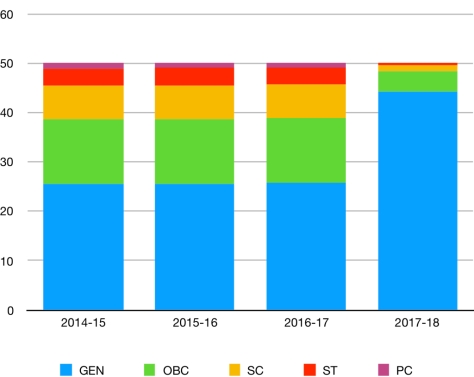
The Public Inquiry also looked into the manner of handling of the disappearance of Najeeb, a JNU student attacked by ABVP activists on campus, and concluded that the alacrity with which fines and punishments were dealt out to other students for peaceful, non-violent protests was not shown in this case. The VC’s ‘inaction’ in Najeeb’s case (he is still missing) was patent and appears motivated.
The Public Hearing concluded that the Vice Chancellor is guilty of each of the charges laid out against him and also guilty of
leading a process that can be unambiguously described as having disastrous consequences for the future of this premier institution as a centre of academic excellence in the widest possible sense of the term
and concluded therefore, that Professor M. Jagadesh Kumar is unfit to be the Vice-Chancellor of JNU. The members of the jury also suggested that a class action litigation or an appeal for a Visitor’s inquiry could be the route to follow in case Professor Jagadesh Kumar does not step down on his own, as a self-respecting Vice-Chancellor should under these circumstances.
(The full report of the Public Enquiry is available here).
Since then several reports on the ‘Appointments Scam’ in JNU have emerged in the media, showing the extent to which the Vice Chancellor has single handedly controlled every faculty appointment made in the last few months, flouting even the semblance of legality or rule-bound functioning. See Vandana in The Week , Ajoy Ashirwad Mahaprashasta in The Wire and Aranya Shankar in The Indian Express.
A little over a year ago, in December 2016, here on Kafila, the statement by 20 faculty members of the 142nd Academic Council meeting (about half the members present), was published along with a report on the shockingly illegal conduct of that AC meeting. The statement said in part:
The minutes of the previous (141st) Academic Council meeting that had been circulated contained many errors, misrepresentations, and falsities. Several of these had been pointed out by many members of the Academic Council, including in written representations to the Registrar.
The Registrar misled the Academic Council that no written submissions had been received and retracted only when copies of such responses were provided to him. The repeated tampering of minutes has become a serious problem that is affecting the functioning of the university and is against all procedural norms.
Every single AC meeting conducted under this Vice Chancellor since then has seen the continued falsification of Minutes and protests are termed as disruptions.
What is significant today is that yesterday, one of the new external (non-JNU) members of the AC inducted by the current VC, Madhu Kishwar, who is not known for her sympathies to the Left, publicly declared that the decision on compulsory attendance was not taken in the AC meeting, as the VC has publicly claimed. To Republic TV for example, the VC said:
Vice-chancellor cannot take any decision. It is the statutory bodies that decide the rules, regulations and formulae. As a single member of the academic council, a VC can’t along (sic) (alone?) bring any rule.
Well, he is lying. While his ‘team’ in the administration and those AC members who derive benefits from his administration go along with his lies, Madhu Kishwar, whatever her ideological or political leanings, has had the decency to disassociate herself from the procedural violation involved in claiming a decision as backed by the body of which she is a member, when she knows full well that it was not.
Below is the series of tweets in which she makes her own position clear on compulsory attendance. But the key point she makes is that whatever her views, this issue was not even on the agenda, and came up accidentally in the course of another discussion.
The point is that this VC and his administration lie without compunction. They lie when they claim university property was damaged by the latest protest in which students reclaimed Freedom Square. What happened was that the flower pots that the administration placed on the iconic steps to prevent students from sitting there, were removed to the side; some of them broke, but the plants were re-potted by the students themselves!
Students perform at Freedom Square
They lie when they claim that the main road to the university was ‘blocked’, causing ‘enormous hardship for the elderly, sick, school children and the visitors to the campus’. One way in was blocked, but all vehicles could continue along many other paths to their destination.
They lie when they claim that compulsory attendance is meant to improve academic standards. It is meant to establish a surveillance regime to further continue what Kishwar terms a ‘civil war’ that the VC has unleashed on campus. Every single step taken by this administration has been meant to destroy a vibrant academic and intellectual culture, self-critical and democratic, a culture that is anathema to the dispensation ruling the country today.
The VC has consistently refused to meet either office bearers of JNUTA or JNUSU. When the students declared that they would continue the agitation until the next Academic Council meeting, scheduled for the 23rd of February, the VC postponed the AC meeting indefinitely. This decision alone shows the complete moral defeat of this VC and his administration.
A top ranking university, using public funding to make higher education available to heterogeneous publics in India, is being sought to be tamed, silenced and brought into line with an authoritarian, violent regime.
So no, the struggle in JNU is not about the right not to attend classes. It is about reclaiming the right to education, and our students are leading the way.
UPDATE. Professor Kavita Singh speaks at JNUTA Aakrosh Dharna on February 19, 2018

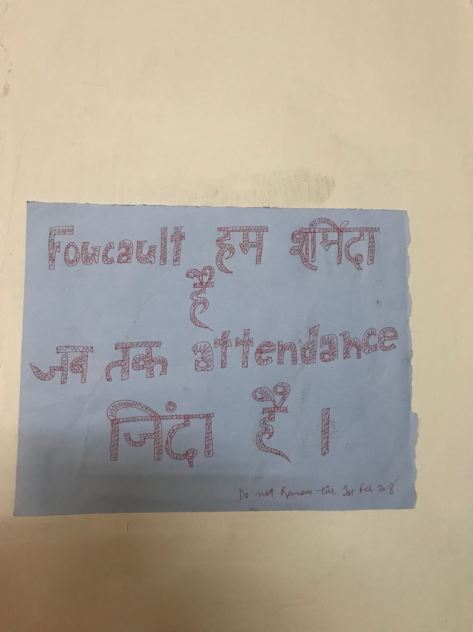
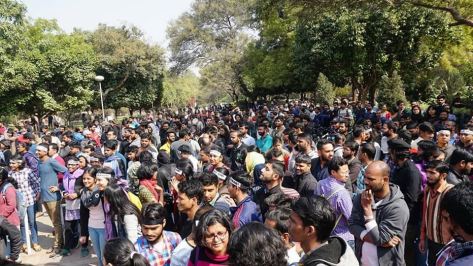
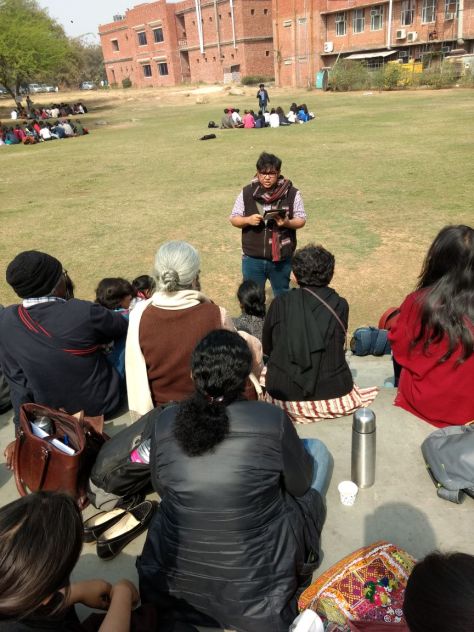
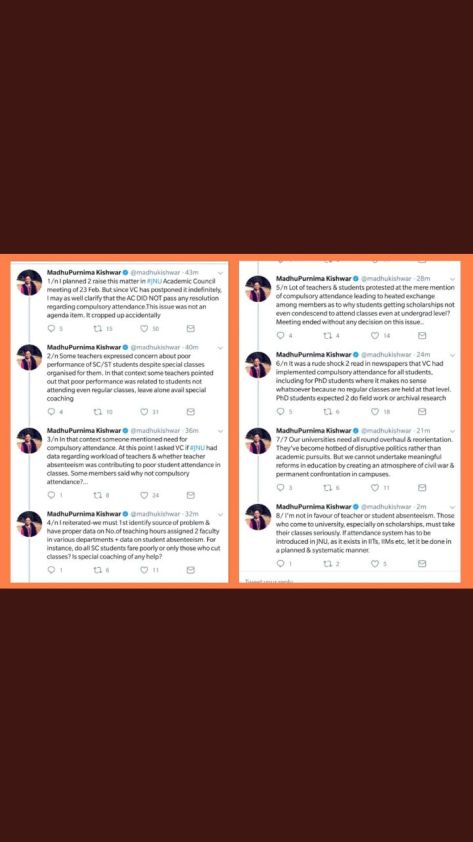

Fabulous piece. THE VC wants to shut JNU down sine die. He will then clear all the hostels, shut down teaching. He will reopen after a semester with a new set of rules: no union, no hostel meetings, no public meetings, in short no politics that he does not like. We don’t need another tank; he is doing quite well, thank you, destroying JNU.
LikeLike
VC is still continuing just because of the strong support from outside – the right wing organisations, the UGC and the government …. He should have stepped down long ago but for the support…..he is a stooge appointed to crush dissent and healthy criticism
LikeLike
JNU VC should immediately stepdiwn. Such a corrupt liar does not have any moral authority to continue the position.
LikeLike
I so wish that the sold out media(s) would have a look on our arguments before taking side of this man! Sometime I wonder how shameless he could be that he continued to lie even when the whole university identifed him as the liar! I am sure that this authoritarian liar is bound to fall. Fall very badly infact! Waiting for the day with much hope! ✊
LikeLike
Though JNU is a striking example of the attempt at subjugating Universities and intimidation of intellectuals,yet, we need to note that this is the trend that is common to all educational institutions. People who are under investigation are being appointed as Vice-Chancellors. All academic bodies are being packed with half baked intellectuals and political activists of Hindutva. We stand with JNUSU and JNUTU in their position on the V.C.
LikeLike